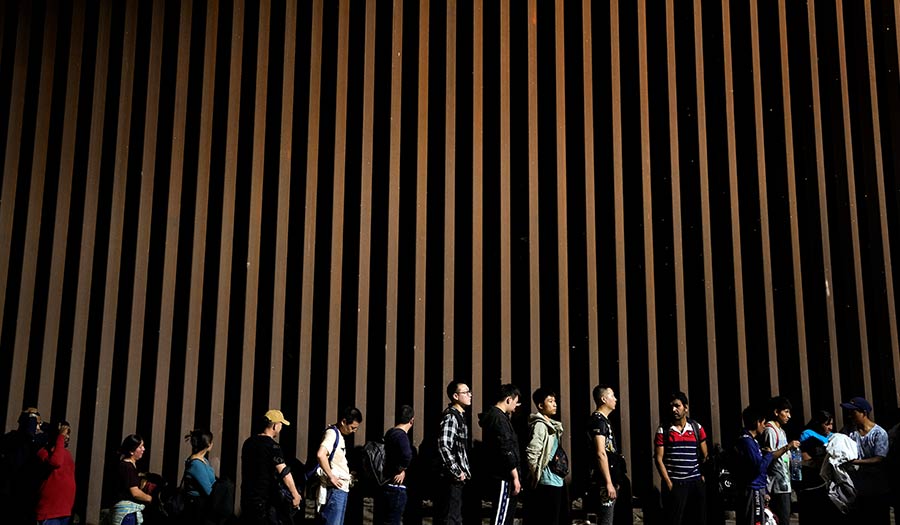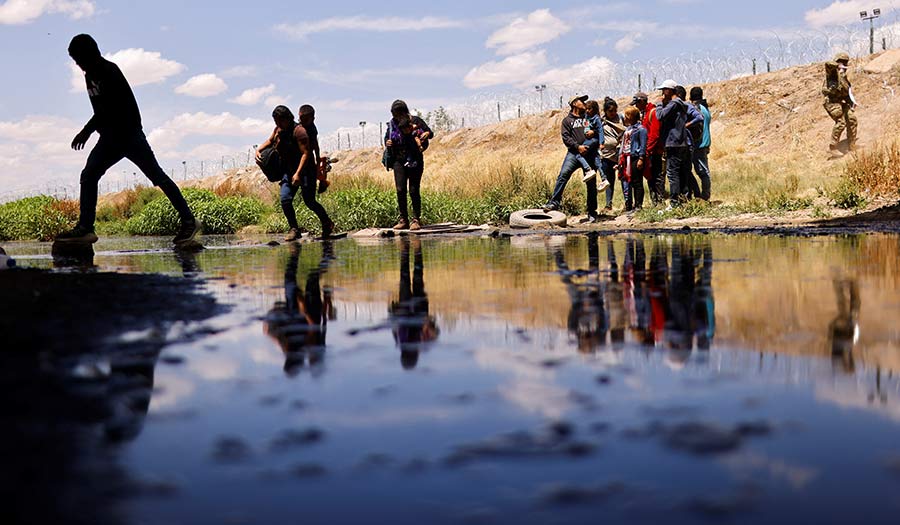 AP/Gregory Bull
AP/Gregory Bull
World News Desk
Learn the why behind the headlines.
Subscribe to the Real Truth for FREE news and analysis.
Subscribe NowSAN DIEGO (AP) – Immigration advocates said Thursday that an online appointment system to seek asylum at the U.S. border with Mexico is out of reach for many migrants, in the latest legal challenge to the Biden administration’s immigration agenda.
The lawsuit says the administration, often working with Mexican authorities, has physically blocked migrants from claiming asylum at land crossings with Mexico unless they have an appointment through the CBP One app. It says the app is “impossible” for those with inferior internet access, language difficulties or lack of technical know-how. Appointments are capped at 1,450 a day.
“CBP One essentially creates an electronic waitlist that restricts access to the U.S. asylum process to a limited number of privileged migrants,” according to the lawsuit by advocacy groups Al Otro Lado and the Haitian Bridge Alliance and would-be asylum-seekers from Mexico, Haiti, Nicaragua and Russia who say they could not get appointments while waiting in Mexico.
More than 38,000 people were processed for entry using CBP One in June and more than 170,000 got appointments during the first six months of the year, U.S. Customs and Border Protection said last week.
CBP said late Thursday that use of the app has increased processing at land crossings to “historic levels,” significantly expanding access to asylum and humanitarian protections. At the same time, the agency said it continues to serve people “who walk up to a port of entry without an appointment.”
The lawsuit is the latest legal threat to the Biden administration’s carrot-and-stick approach to the border that combines new avenues for legal entry, like CBP One, and shuts down routes to asylum for those who enter the country without government permission.
Officials say the approach is working, noting a sharp drop in illegal crossings since a rule took effect on May 11 that allows authorities to deny asylum to migrants who arrive at the border without applying on CBP One or seeking protection in another country they passed through. In June, authorities stopped migrants nearly 145,000 times, the lowest level since February 2021 and down 43 percent from December’s peak.
But the lawsuits complicate President Joe Biden’s efforts to introduce new policies.
“Litigation is, to a certain extent, dictating immigration policy along the border, also in the interior,” Kathleen Bush-Joseph, an analyst at the Migration Policy Institute, a think tank, said.
Here is a look at some of the other legal challenges and where they stand.
New Asylum Limits
The government is appealing a federal judge’s decision to block the new asylum rule. U.S. District Judge Jon Tigar delayed his ruling from taking effect for two weeks. It may fall to an appeals court to decide whether to keep the rule in place during what may be a lengthy challenge.
Some legal observers do not expect a final resolution until 2025, probably in the Supreme Court.
Migrants from Cuba, Haiti, Nicaragua and Venezuela
Another closely watched case challenges the administration’s policy to grant parole for two years to up to 30,000 people a month from Cuba, Haiti, Nicaragua and Venezuela if they apply online with a financial sponsor and arrive at an airport. Texas is leading 21 states to argue that Mr. Biden overreached his authority, saying it “amounts to the creation of a new visa program that allows hundreds of thousands of aliens to enter the United States who otherwise have no basis for doing so.”
A trial is scheduled for August 24 in Victoria, Texas, before U.S. District Judge Drew Tipton. Legal observers anticipate a decision in the fall.
Mexico says the policy was critical to it agreeing to take back people from those four countries who enter the U.S. illegally and are denied asylum.
Releasing Asylum-seekers in the U.S.
An appeals court could rule soon on the Biden administration’s use of what is known as humanitarian parole, in which asylum-seekers are released in the U.S. while they pursue cases in immigration court.
U.S. District Judge T. Kent Wetherell II said in a March ruling prohibiting the practice that the administration “effectively turned the Southwest Border into a meaningless line in the sand.”
The Border Patrol paroled 572,575 migrants last year, including a record-high 130,563 in December. The practice sharply subsided even before the administration lost a lawsuit by the state of Florida, but it wants the option in case Border Patrol stations become too overcrowded.
Other Republican-led Challenges
Texas sued the administration in May to block Mr. Biden’s policies, particularly the use of CBP One. “The Biden Administration’s attempt to manage the southern border by app does not meet even the lowest expectation of competency and runs afoul of the laws Congress passed to regulate immigration,” the lawsuit states.
Indiana and 17 other states sued the administration on similar grounds, saying in its federal lawsuit filed in North Dakota that new policies “will further degrade our nation’s border security and make it even easier to illegally immigrate into the United States.”
Neither case appears headed toward a swift resolution.
- Real Truth Magazine Articles
- AMERICAS
 Why Do Migrants Want to Be in America?
Why Do Migrants Want to Be in America?


